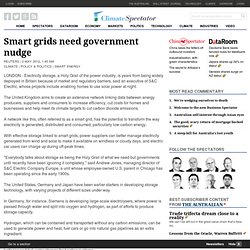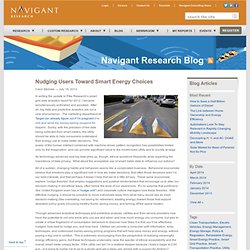

Smart grids need government nudge. LONDON - Electricity storage, a Holy Grail of the power industry, is years from being widely deployed in Britain because of market and regulatory barriers, said an executive of S&C Electric, whose projects include enabling homes to use solar power at night.

The United Kingdom aims to create an extensive network linking data between energy producers, suppliers and consumers to increase efficiency, cut costs for homes and businesses and help meet its climate targets to cut carbon dioxide emissions. A network like this, often referred to as a smart grid, has the potential to transform the way electricity is generated, distributed and consumed, particularly low-carbon energy. With effective storage linked to smart grids, power suppliers can better manage electricity generated from wind and solar to make it available on windless or cloudy days, and electric car users can charge up during off-peak times. » Nudging Users Toward Smart Energy Choices Pike Research. In writing the update to Pike Research’s smart grid data analytics report for 2012, I became simultaneously enthralled and spooked.

After all, big data and predictive analytics are not a new phenomenon. The marketing department at Target can already figure out if I’m pregnant (I’m not) and send me money-saving coupons for diapers. Surely, with the precision of the data being collected from smart meters, the utility should be able to help consumers understand their energy use to make better decisions. The power of the human intellect combined with machine-driven pattern recognition has possibilities limited only by the imagination, and can provide significant value to the modernized utility and to society at large. As technology advances and big data piles up, though, ethical questions frequently arise regarding the importance of data privacy. Connectivityweek. I want to ask you two questions: 1) How much was your electric bill last month?

2) Why did you pay that much (or that little)? If you are like most people, you probably have a vague idea about the answer to the first question, but the second one has you stumped. Sure, you may remember you ran the air conditioner a bit more (or a bit less) last month because it was hotter (or cooler) than normal. Maybe you were on vacation, so your house sat empty and dark. The point is you have some educated guesses. The result is that every day, millions of Americans make decisions about energy that could be much better.
Behavioral economics will play a major role in the success of the smart grid. In the area of energy consumption, one immediate area where improvement could be made is through better feedback about energy usage and its consequences. With a few creative tweaks, the Orb might have cut down on energy use further. Notice also what a crude device the Ambient Orb is. Www.ieadsm.org/Files/Exco File Library/Spotlight Newsletters/IEA DSM Spotlight-Issue39-December 2010.pdf.